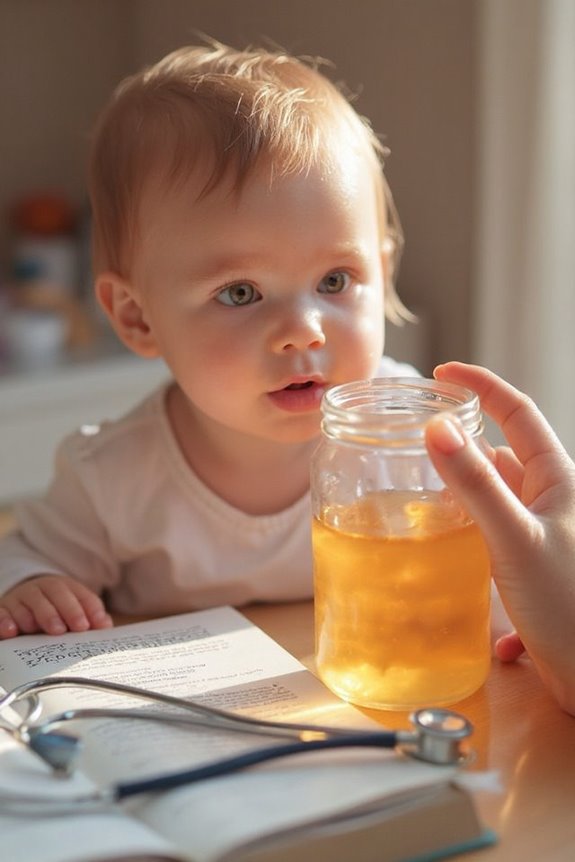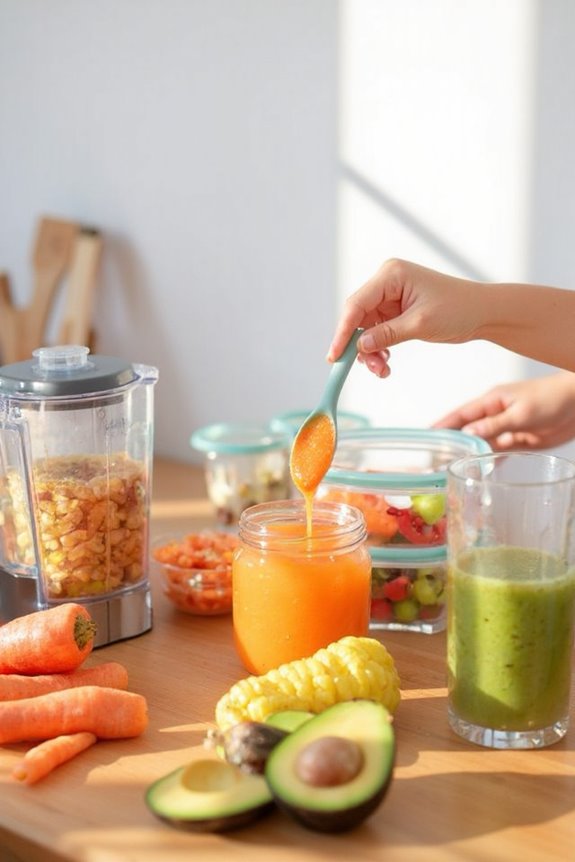Babies under 12 months should never consume honey because it can contain Clostridium botulinum spores. Unlike adults, infants have immature digestive systems that can’t kill these spores, allowing them to colonize the gut and produce a dangerous toxin. This leads to infant botulism, which causes potentially life-threatening paralysis starting with constipation and progressing to breathing difficulties. All honey varieties pose this risk, even pasteurized products. The remaining content explores other risk sources and prevention strategies.
Key Takeaways
- Honey can contain Clostridium botulinum spores that cause infant botulism in babies under 12 months.
- Infants’ immature immune systems and gut microbiomes cannot effectively defend against botulinum spores.
- Babies have lower stomach acid levels, allowing botulinum spores to survive and colonize their intestines.
- Infant botulism begins with constipation and progresses to potentially life-threatening neuromuscular paralysis.
- No safe amount of honey exists for babies under 12 months, which is why pediatricians strictly prohibit it.
The Hidden Danger: Understanding Infant Botulism
While honey seems like a natural sweetener that couldn’t possibly cause harm, it poses a serious and potentially life-threatening risk to babies under 12 months of age. This danger stems from a condition called infant botulism.
What happens in infant botulism:
- *Clostridium botulinum* bacterial spores found in honey colonize a baby’s intestine
- These spores produce a toxin that attacks the nervous system
- Initial symptoms include constipation followed by neuromuscular paralysis
- *Clostridium botulinum* bacterial spores found in honey colonize a baby’s intestine
The immature digestive systems of infants can’t fight off these spores the way older children and adults can. This is why pediatricians emphasize infant health precautions that include avoiding honey completely until after a child’s first birthday.
Most cases affect babies under six months old, with the highest risk between two weeks and six months of age.
How Botulinum Spores Affect a Baby’s Developing System
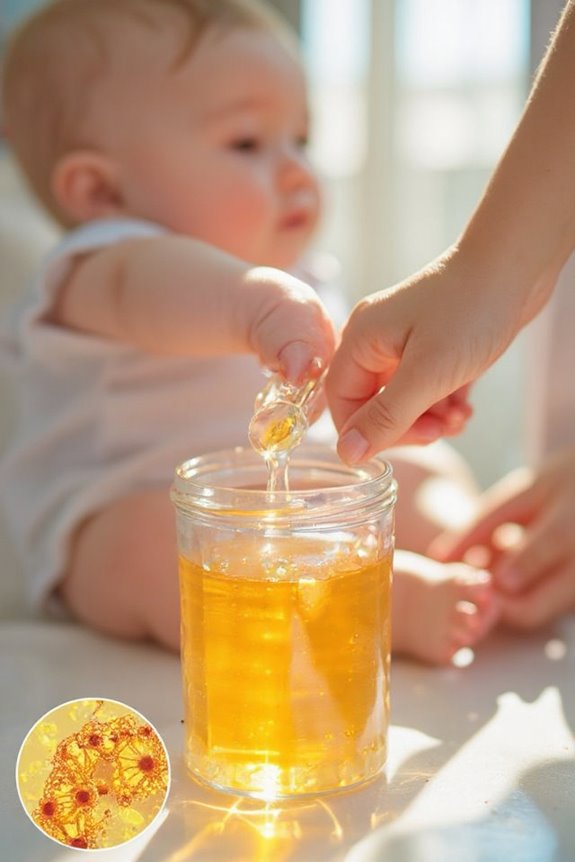
When a baby’s developing body encounters botulinum spores, their immature immune system simply can’t defend against this invisible threat like an adult’s can.
These key factors make infants particularly vulnerable:
- Lower stomach acidity allows spores to survive and reach the intestines
- Incomplete gut microbiome development means fewer “good bacteria” to compete with harmful organisms
- Immature immune system maturation leaves babies with limited defenses against toxin production
Once in the intestine, spores germinate into bacteria that produce a dangerous neurotoxin. This toxin disrupts nerve signals to muscles, potentially causing:
- Weakness in limbs and facial muscles
- Difficulty swallowing and feeding
- Constipation
- Breathing problems in severe cases
Most babies recover fully with proper medical care, but prevention through avoiding honey is essential.
The Science Behind Honey’s Risk to Babies Under One
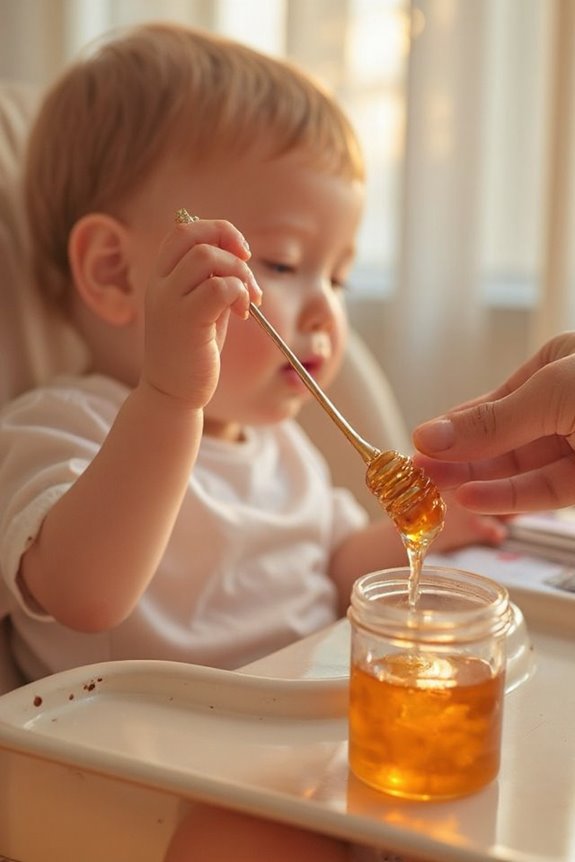
The dangerous truth about honey for infants lies in microscopic spores that pose virtually no threat to older children and adults. These Clostridium botulinum spores can survive in honey composition despite its antimicrobial properties.
When examining honey’s risk to babies, I need to emphasize two critical factors:
- Spore Survival: Botulinum spores can remain viable in honey indefinitely, resisting typical food preservation methods.
- Immature Digestive Systems: Babies under 12 months lack the stomach acid and gut flora to prevent these spores from germinating.
Once ingested, these spores can grow in an infant’s intestine and produce potent neurotoxins that cause infant botulism—a potentially life-threatening condition. This scientific reality is why health authorities worldwide prohibit honey for babies under one year old.
Beyond Honey: Other Sources of Botulinum Spores
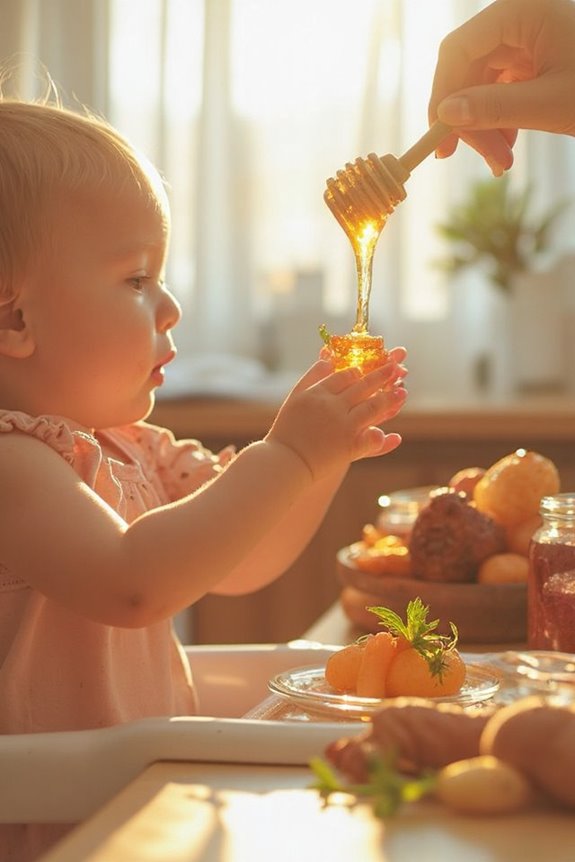
Although honey receives the most attention as a source of infant botulism risk, I’d like to clarify that Clostridium botulinum spores lurk in many other places throughout our environment.
These alternative sources of botulinum spores include:
- Soil-contaminated foods, especially root vegetables like potatoes, carrots, and beets
- Leafy greens such as spinach that may contain soil particles
- Improperly home-canned low-acid foods (mushrooms, green beans)
- Some fish and meat products including fermented varieties
- Environmental sources like soil and water
The spores become particularly dangerous in oxygen-free conditions, which can develop in:
- Vacuum-sealed packages
- Canned goods with improper processing
- Foods stored at room temperature for extended periods
Understanding these alternative sources helps parents protect their babies from all potential botulism risks.
Recognizing the Symptoms of Infant Botulism
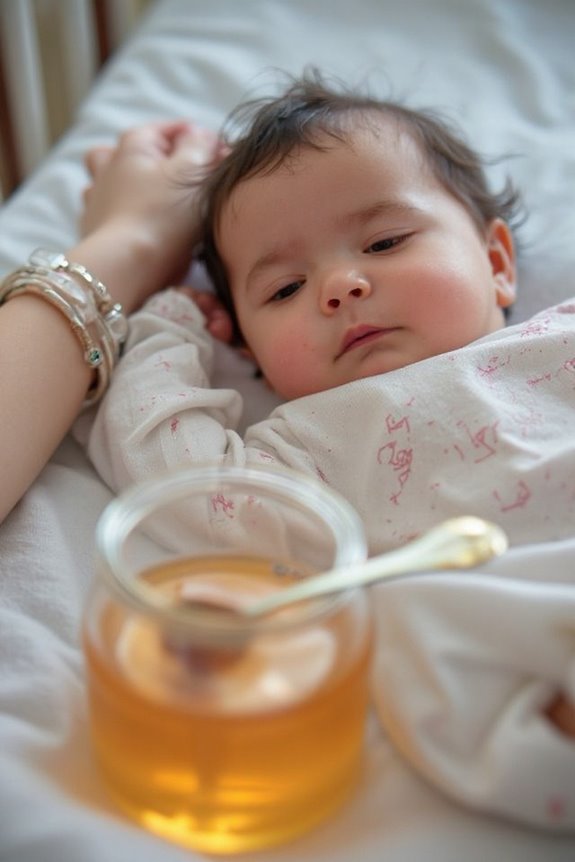
While we’ve covered various sources of botulinum spores beyond honey, identifying the actual symptoms of infant botulism can save your baby’s life. Symptom recognition begins with constipation, often the earliest warning sign.
Watch for these progressive indicators:
- Weak cry or facial expressions
- Decreased movement and “floppy” appearance
- Poor feeding or difficulty suckling
- Drooping eyelids
- Loss of head control
If you notice these symptoms, immediate medical attention is essential. Early intervention dramatically improves outcomes. Doctors will perform diagnostic tests including stool samples and physical examinations to confirm the condition.
Remember: symptoms typically appear between 3-30 days after exposure to the bacteria. Since infants can’t tell us how they feel, your vigilant observation is their best protection against this serious but treatable condition.
The Crucial First Year: Why Babies Are Particularly Vulnerable
During your baby’s first year of life, their immune system undergoes dramatic development that leaves them uniquely vulnerable to certain threats that adults can easily fight off.
In newborns, innate immunity provides basic protection, but their adaptive immune system—which recognizes and remembers specific pathogens—remains immature. Your baby’s immune system relies heavily on:
- Maternal antibodies, which diminish over several months
- Gradual maturation of specialized immune cells
- Development of infant-specific defense mechanisms
This developmental timeline explains why babies under 12 months cannot safely consume honey. Their immature immune systems simply lack the capability to fight off Clostridium botulinum spores that adult systems neutralize without difficulty. This vulnerability decreases as your baby reaches key immune system development milestones.
Medical Consensus and Research on Honey Safety
Since the late 1970s, when infant botulism was first recognized, medical experts have consistently warned against giving honey to babies under 12 months old. This guidance isn’t arbitrary—it’s based on solid research showing that honey samples frequently test positive for Clostridium botulinum spores.
The CDC and other health organizations have established clear infant guidelines prohibiting honey consumption before a baby’s first birthday. Here’s why:
- Infant digestive systems can’t prevent these spores from growing and producing toxins
- Over 1,000 documented cases in the U.S. confirm the risk
- No safe amount of honey exists for babies under 12 months
While honey offers health benefits for older children and adults, the safety risks for infants are simply too great to ignore.
Real Cases: When Honey Consumption Led to Botulism
Despite being a natural food many adults enjoy safely, honey has been directly linked to serious cases of infant botulism across the globe. Medical records document 33-35 incidents worldwide where honey directly caused this potentially fatal illness.
In these real cases, laboratory tests confirmed that honey contained Clostridium botulinum spores matching the exact toxin types (A and B) found in affected infants. The evidence is compelling:
- Most affected babies were under six months old
- Contaminated honey came from various countries, including the U.S.
- Symptoms were severe enough to require hospitalization
- In America, approximately 3.8% of infant botulism cases were tied to honey consumption
These honey incidents, while relatively uncommon, represent entirely preventable tragedies that reinforce why infants under one year should never consume honey.
Safe Alternatives to Sweeten Baby’s Food
When your baby starts solid foods, you’ll need safe options to add natural sweetness without using honey. I recommend these fruit alternatives that provide both flavor and nutrition:
- Mashed fruits like bananas, apples, and pears offer natural sweetness plus essential vitamins
- Sweet potatoes, when cooked and mashed, provide a subtle sweetness with fiber and nutrients
- Unsweetened applesauce can be mixed into yogurt or oatmeal
- Prune paste, made by blending prunes with water, aids digestion while sweetening food
- Dates powder offers concentrated natural sweetness without additives
Unlike honey, these natural sweeteners are safe for babies under 12 months. They’ll help your little one develop healthy taste preferences while avoiding artificial sweeteners, which aren’t recommended for infants due to limited safety research.
Protecting Your Baby: Essential Prevention Strategies
As your baby grows, you’ll need to implement specific strategies to prevent infant botulism. Here’s what you can do:
- Never add honey to baby food or give honey-containing products to infants under 12 months
- Make sure all caregivers understand this restriction, including grandparents and babysitters
- Practice regular cleaning of surfaces where your baby plays to reduce environmental spore exposure
- Wash toys and objects your baby puts in their mouth frequently
While you can’t eliminate all environmental spore exposure, caregiver education is vital. Remember that:
- Most infant botulism cases come from unavoidable environmental sources
- Breastfeeding won’t prevent botulism but may slow symptom progression
- Formula feeding neither increases nor decreases risk
- Seek immediate medical attention if you notice weakness, poor feeding, or constipation
Frequently Asked Questions
Can Botulism From Honey Be Transmitted Through Breast Milk?
No, I can assure you that botulism transmission through breast milk doesn’t occur. As a breastfeeding mom, you can safely consume honey without worry – the toxin doesn’t pass into your breast milk.
At What Exact Age Can Honey Be Safely Introduced?
Like Romeo and Juliet’s age-appropriate romance, honey introduction age is exactly 12 months. I recommend waiting until your baby’s first birthday to guarantee safe food practices and prevent botulism risk completely.
Does Pasteurized or Organic Honey Pose Less Risk?
I’m afraid not. Despite any health benefits, neither pasteurized nor organic honey processing methods kill Clostridium botulinum spores. I recommend avoiding all honey types for babies under 12 months to prevent infant botulism.
Can Siblings Accidentally Expose Babies to Honey Through Sharing?
The nightmare lurks in innocent moments! Yes, I believe sibling sharing can lead to accidental exposure if older children have honey on their hands, utensils, or share partially eaten food containing honey with your baby.
Are Honey-Derived Products Like Cereal or Baked Goods Safe?
Honey-derived products are generally safer due to processing, but I’d still be cautious. Always check ingredient labeling for honey content, especially if you’re concerned about honey allergies in your little one under 12 months.
References
https://www.cdc.gov/botulism/php/national-botulism-surveillance/2018.html
https://www.ncbi.nlm.nih.gov/books/NBK493178/
https://www.cdph.ca.gov/Programs/CID/DCDC/CDPH Document Library/FAQs_English_Updated_March2022_ADA.pdf
https://edis.ifas.ufl.edu/publication/AA142
https://www.infantbotulism.org/parent/prevention.php
https://www.cdc.gov/botulism/hcp/clinical-overview/infant-botulism.html
https://www.mayoclinic.org/diseases-conditions/botulism/symptoms-causes/syc-20370262
https://my.clevelandclinic.org/health/diseases/infant-botulism
https://www.merckmanuals.com/professional/infectious-diseases/anaerobic-bacteria/infant-botulism
https://kidshealth.org/en/parents/botulism.html

